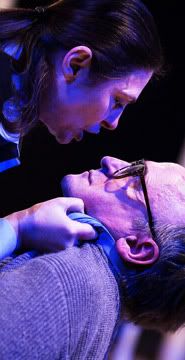
The White Crow (Eichmann in Jerusalem)
York Theatre Royal until 30th May
Damien Cruden, director of White Crow, says that in staging Donald Freed’s play he wanted to use sound and space to bring the audience closer to the story of the Nazi criminal Adolf Eichmann’s trial in Israel in 1961. By manipulating the small, intimate atmosphere of York Theatre Royal’s Studio Space and combining it with imaginative set and sound design, the production is both mesmerizing and thought provoking, moving away from the perhaps expected sentimentality to a mature consideration of the question of guilt and responsibility.
The first act takes place within an enclosed office where policeman Dr Baum is questioning Eichmann in preparation for his trial. Their exchange is picked up by a microphone in the middle of the office and recorded for authenticity and this is what the audience hears. This highly naturalistic staging forces the audience to question their relationship to the seemingly isolated pair. In the second act, the walls are removed, opening the room out until Eichmann and Baum are less than a metre away from the audience. This forceful contrast heightens audience reaction to an almost painful point - as Eichmann strides around refusing to admit to his obvious part in the Final Solution and questioning the motives of his captors, you can feel those in the front row instinctively trying to move further away from him.
Characterisation of Eichmann is cleverly constructed to make the audience continually reassess their perception of the SS Colonel who insists he was ‘Only following orders’. Robert Pickavance produces a controlled and thoughtful performance, careful never to tip the balance in favour of outright evil or vulnerable victim in creating a man determined to avoid becoming a scapegoat. The enigmatic Dr Baum is movingly and sympathetically portrayed by Sonia Petrovna, creating the perfect foil to Pickavance as she tries to find a shred of humanity in Eichmann.
Craig Vear’s accompanying soundtrack is at times seamlessly integrated into the performance but at others an unnecessary emphasis. In keeping with the naturalistic style, it is drawn from sound effects and simple notes rather than mood music. The sound of trains and of Hitler’s speeches are used to remind the audience of the world away from the interrogation cell, but the menacing drones underpinning some of Eichmann’s more prophetic words are overdone. This audience needs no reminding of the constant evil hovering in the room, trying to find one of the pair to settle upon.
The White Crow explores complex questions and is a fine example of how the possibilities of theatre can be explored and crafted into a meaningful audience experience.
Jane Williamson





No comments:
Post a Comment